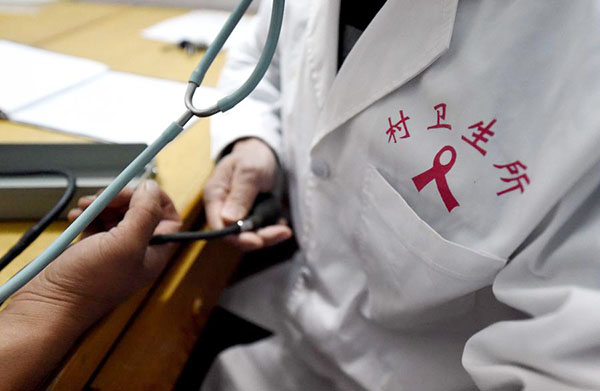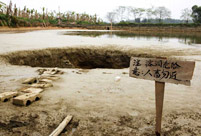


An HIV positive patient, not pictured, receives a blood pressure test in Weishi county, Central China's Henan province in this Nov 30, 2015 file photo. [Photo/Xinhua]
In a major breakthrough that has the potential to revolutionize the whole fight against HIV/AIDS, Chinese scientists recently modified a gene in embryos in an attempt to make humans immune to HIV virus.
Researchers from the Guangzhou Medical University used a gene editing technique named CRISPR/Cas to replace the CCR5 gene in 26 human embryos with an HIV-resistant mutation. Only four embryos were successfully edited, while the other 22 cases failed to produce the desired results.
The research was reported in the Journal of Assisted Reproduction and Genetics.
"In this study, we demonstrated that the HIV-resistant mutation could be introduced into early human embryos through the CRISPR system," said Fan Yong, a researcher of the Guangzhou Medical University and an author of the paper.
The CRISPR/Cas9 gene editing technique, better known as the molecular Swiss army knife, is a technology developed by US scientist Jennifer Doudna and French scientist Emmanuelle Charpentier in 2012.
Since then, scientists from across the globe have been using the technology to edit animals' gene in the laboratory.
Huang Junjiu, a biologist at Sun Yat-Sen University in Guangzhou, was the first to apply the technique to humans. He reported his experiment on 71 human embryos in Nature magazine in April 2015.

Testing kits that use small samples of blood usually provide a result within 15 minutes. Zou Hong/China Daily
Despite the fact that Huang's team used embryos from fertility clinics that could not have progressed to live births, their work sparked a global debate on the ethics of such research.
In December representatives from more than 20 countries gathered at a meeting organized by scientists from China, US and UK to discuss these ethical issues.
"Our experiments have gone through an ethical review at our research institute. Unlike the UK, currently China does not have a government authority that accepts and examines applications for this kind of research," said Fan from the Guangzhou Medical University.
Besides editing human embryos, scientists also tried to use CRISPR/Cas9 as a "molecular knife" therapy to cut off HIV within cellular DNA. But a study by Canadian and Chinese researchers published in US journal Cell earlier this month found that the virus can quickly develop resistance to the gene editing technique.
The latest gene editing technique used by Guangzhou Medical University can be traced back to nine years ago when a 41-year-old man dubbed the "Berlin patient", who had both AIDS and leukemia, was on the verge of death. His doctor gave him a bone-marrow transplant from an HIV-resistant donor and miraculously cured both conditions, making him the first person ever to be cured of AIDS.
The remarkable case shed light on CCR5 — a receptor in humans that helps HIV to enter cells — as the bone-marrow transplant changed the patient's gene to a mutation called CCR5-delta32 that blocks HIV.
 The evolution of J-10 fighter
The evolution of J-10 fighter Top 10 Asian beauties in 2016
Top 10 Asian beauties in 2016 What's happening in Xisha Islands?
What's happening in Xisha Islands? When female soldiers meet flowers
When female soldiers meet flowers North Sea Fleet conducts drill in West Pacific Ocean
North Sea Fleet conducts drill in West Pacific Ocean Old photos record the change of Sichuan over a century
Old photos record the change of Sichuan over a century Breathtaking aerial photos of tulip blossoms in C China
Breathtaking aerial photos of tulip blossoms in C China Horrific: Pit swallows 25 tons of fish overnight
Horrific: Pit swallows 25 tons of fish overnight Vietnamese Su-30 fighters fly over Nanwei Island in South China Sea
Vietnamese Su-30 fighters fly over Nanwei Island in South China Sea Top 20 hottest women in the world in 2014
Top 20 hottest women in the world in 2014 Top 10 hardest languages to learn
Top 10 hardest languages to learn 10 Chinese female stars with most beautiful faces
10 Chinese female stars with most beautiful faces China’s Top 10 Unique Bridges, Highways and Roads
China’s Top 10 Unique Bridges, Highways and Roads Great service or too much
Great service or too much Reality show sparks anger after endangering relics
Reality show sparks anger after endangering relics Relocated farmers not provided government services
Relocated farmers not provided government services ‘Leftover Women’ don’t want to wear stereotyped labels, even proudly
‘Leftover Women’ don’t want to wear stereotyped labels, even proudlyDay|Week